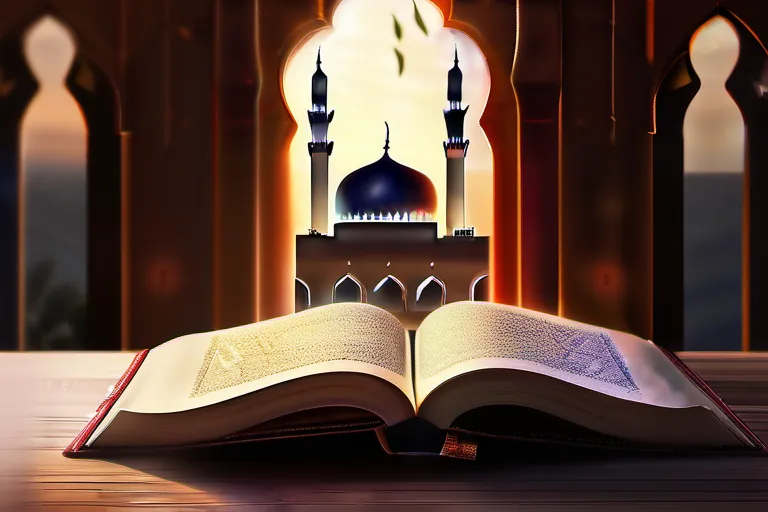Explore the distinctive aspects of Islamic theology and gain a deeper understanding of its key principles.
Islamic theology, also known as Kalam, is a vital aspect of Islam that delves into the nature of God, the universe, and the relationship between faith and reason. In this article, we will explore what makes Islamic theology unique and provide a detailed overview of its key principles.
The Nature of God in Islamic Theology
In Islamic theology, the concept of Tawhid stands as a cornerstone, defining the very essence of God’s nature and His relationship with humanity. Is it not intriguing to ponder how Tawhid shapes our understanding of divinity? This principle of oneness asserts that there is no god but Allah, emphasizing a singular, indivisible deity devoid of partners or associates.
Imagine a vast expanse where all paths converge at one single point—this is akin to the monotheistic path of Islam. The attributes ascribed to God in Islamic theology are numerous and profound. Each attribute like Wadud (the Loving), Majid (the Glorious), or Jalil (the Majestic) paints a picture of His multifaceted nature, each one enriching our comprehension of the divine character.
The relationship between God and creation is intricate. It is often likened to that of a parent to their child, where God both guides and nurtures all beings. Yet, this bond is not one of mere dependency; it is an interwoven fabric of existence, where every action has consequences, mirroring the divine will.
The importance of monotheism cannot be overstated. It serves as a beacon in a world often clouded by polytheistic practices and idolatrous beliefs. By asserting Tawhid, Islam provides a clear path, guiding individuals toward a unified understanding of God’s sovereignty over all creation. This concept is not just theoretical but practical, influencing ethical conduct, social justice, and personal spirituality.
In the journey to understand Tawhid, one finds a profound depth in simplicity. It challenges us to look beyond superficialities and delve into the core of our existence. As we explore these concepts, let us reflect on how they shape not just our faith but also our approach to life itself.
The Role of Reason and Revelation
Can we truly understand God without using our minds? How do reason and revelation intertwine in Islamic theology to give us a clearer picture of His will?
The balance between Aql, meaning reason, and Wahy (revelation) is one of the unique aspects that sets Islamic theology apart. These two sources work like two sides of a coin, each essential for understanding the other.
-
Reason allows us to explore the world around us, understand natural phenomena, and derive moral principles from our experiences. It helps us question and seek answers about our existence and purpose.
-
Revelation, on the other hand, provides direct guidance from God through scriptures like the Quran and the teachings of the Prophet Muhammad (PBUH). This divine revelation offers clear instructions that complement what we can discover through reason.
Imagine Aql as a flashlight illuminating our path in the dark forest. While it helps us navigate and understand the surroundings, Wahy is like a map that shows us the way to safety. Together, they create a comprehensive understanding of God’s will and commandments.
This integration between reason and revelation fosters a dynamic relationship with God. It encourages Muslims to engage in intellectual discourse while also adhering to divine teachings. This balance ensures that our understanding of Islam remains both intellectually sound and spiritually enriched.
The Concept of Prophethood
What makes Islamic theology unique lies deeply within its understanding of prophethood, which stands as a cornerstone of the faith. Imagine a world where every soul has a map to guide them; prophets in Islam are like beacons illuminating this path for humanity.
Prophets and Their Mission
In Islamic theology, prophets were sent by Allah with a noble mission: to convey the message of monotheism (Tawhid) and guide people towards righteousness. Each prophet had a specific role, but they all shared a common goal: to restore society to its purest form, free from idolatry and injustice.
The Relationship with God
The relationship between prophets and Allah is one of profound intimacy. They are seen as intimate friends who received revelations directly from the Almighty. This connection highlights how prophets acted as intermediaries, bridging the gap between humanity and divinity. Consider this: just as a father communicates essential teachings to his children, so too did Allah communicate His wisdom through His chosen messengers.
The Last Prophet, Muhammad (PBUH)
Among all prophets, Muhammad (Peace Be Upon Him) holds a unique status. He is not only the final prophet but also the seal of the prophets. This means that no other messenger will come after him to renew or alter divine guidance. His mission was comprehensive, addressing every aspect of human life – from personal piety to social justice. The Quran, revealed through Muhammad (PBUH), provides a complete code of conduct for Muslims.
Through the lens of prophethood in Islam, one cannot help but wonder: how do these teachings apply to our lives today? By understanding and emulating the examples set by prophets, we can strive towards living a life that is pleasing to Allah. This journey, much like walking through a desert towards water, requires guidance – and the prophets serve as those guiding lights.
The Role of Prophets in Islamic Theology
Ultimately, prophethood in Islam emphasizes the importance of following divine guidance for spiritual and moral growth. It serves as a reminder that our actions have consequences, and by adhering to the teachings of prophets, we can find peace and fulfillment.
What role do you think prophets play in your life?
The Doctrine of Predestination
The doctrine of Qadar, often translated as predestination, is a profound and intricate aspect of Islamic theology that has deeply influenced how Muslims perceive their lives and actions. How can something so central to one’s faith be both understood and accepted without feeling a sense of determinism or lack of personal responsibility? Is it not like weaving a tapestry where every thread, though predetermined by the weaver’s vision, still allows for individual touches that make each piece unique?
In the context of Qadar, Muslims believe in the absolute knowledge and power of Allah. This belief is often encapsulated in the saying, ‘Whatever you have earned, it has been recorded.’ It emphasizes that everything that happens—good or bad—is part of a greater divine plan. But here’s where the complexity lies: how can one reconcile this with the concept of human free will?
The answer lies in understanding the difference between Qadar and Taqdeer. While Qadar refers to the predetermined decrees of Allah, Taqdeer involves the implementation of these decrees. In other words, every person’s destiny is set, but how they fulfill that destiny is through their choices and actions. This dual perspective offers a balance between divine omniscience and human free will.
Moreover, this doctrine holds profound implications for justice. If everything is preordained, then why should people strive to do good? Isn’t it contradictory? The answer often lies in the understanding that striving towards righteousness is both an act of worship and a demonstration of trust in Allah’s wisdom. It’s like planting seeds; while the harvest may be predetermined, the effort in nurturing the plants still matters.
Understanding Qadar thus becomes not just a theoretical exercise but a practical approach to life. It encourages Muslims to take responsibility for their actions, knowing that they are part of a greater plan guided by Allah’s perfect wisdom and justice. In this way, Qadar serves as both a comfort in times of uncertainty and a motivation for living a virtuous life.
The Concept of Paradise and Hell
Imagine walking through a garden where every flower blooms perfectly, every path leads to beauty, and the air itself seems to whisper promises of eternal peace. In Islamic theology, this utopia is known as Jannah, the Paradise. But what exactly does it entail? Is it merely a place of physical pleasure or something more profound?
According to Islamic teachings, Jannah is not just an afterlife reward for believers but also serves as a metaphor for spiritual fulfillment and closeness to God. It offers a respite from the trials of this world, yet it is far from being idle or devoid of purpose. The inhabitants engage in acts of worship and service, praising their Creator with hearts full of joy and gratitude.
Now, consider the opposite—Jahannam, or Hell. It’s often depicted as a place of torment and despair. But why does this concept exist? Isn’t it enough to focus on the blessings of Jannah? The answer lies in understanding that the fear of punishment can serve as an incentive for moral conduct. By emphasizing the consequences, Islamic theology aims to create a balance between reward and accountability.
So, how do these concepts guide behavior in this life? The criteria for entry into Jannah and avoidance of Jahannam hinge on one’s actions, beliefs, and intentions. Good deeds, including faith, charity, and compassion, are crucial. But it’s important to note that faith alone is not sufficient; the actions must be sincere and motivated by good intentions.
In this journey through life, Jannah serves as a beacon of hope, motivating believers to strive for righteousness. It encourages them to make choices that reflect their commitment to God’s will, much like navigating a maze with the light at the end guiding their path. Conversely, the awareness of Jahannam acts as a deterrent against vice and sin, ensuring that every step taken in this world is mindful of its consequences.
In essence, these concepts are not merely theoretical constructs but practical tools for spiritual development. They inspire believers to lead meaningful lives, fostering a sense of purpose and a deeper connection with the divine.
The Importance of Hadith
Have you ever wondered how Islamic theology manages to provide such detailed guidance for its followers? One crucial element that stands out in this theological framework is the Hadith. These are accounts of the sayings and actions of the Prophet Muhammad, serving as a bridge between divine revelation and practical application. How did these traditions come to be, and why do they hold such significance?
The collection of Hadiths began shortly after the death of the Prophet Muhammad, with his companions meticulously recording every word and deed attributed to him. Over time, this process evolved into a systematic effort by scholars who aimed to authenticate these sayings through rigorous examination and cross-referencing. The Sahih collections, compiled by scholars like Bukhari and Muslim, are considered the most reliable sources of Hadiths.
The role of Hadith in Islamic theology is akin to a compass guiding travelers on their journey. Just as a compass points towards the north, Hadith guides Muslims in understanding and practicing their faith. They provide clarity on matters not covered in the Quran and offer practical examples that exemplify the Prophet’s behavior, making it easier for followers to emulate his teachings.
Moreover, Hadiths play a pivotal role in shaping Islamic law (Sharia). They are often used as secondary sources alongside the Quran when deriving legal rulings. For instance, in matters of contracts or marriage, Hadiths offer specific guidelines that ensure fairness and justice. The authenticity and reliability of these traditions are crucial for any legal decision-making process.
Reflect on this: if the Prophet Muhammad was your mentor, would you not want to know every detail about his teachings? Through Hadith, Muslims have access to a treasure trove of wisdom, ensuring that their faith remains alive and relevant in every era. So, why are these traditions so important for Islamic theology? Because they bridge the gap between theory and practice, offering a comprehensive guide to living a righteous life.
Conclusion
 By understanding the distinctive aspects of Islamic theology, you will gain a deeper appreciation for the richness and complexity of this ancient tradition. Whether you are a student, scholar, or simply curious, this guide offers valuable insights into one of the world’s major religions.
By understanding the distinctive aspects of Islamic theology, you will gain a deeper appreciation for the richness and complexity of this ancient tradition. Whether you are a student, scholar, or simply curious, this guide offers valuable insights into one of the world’s major religions.











